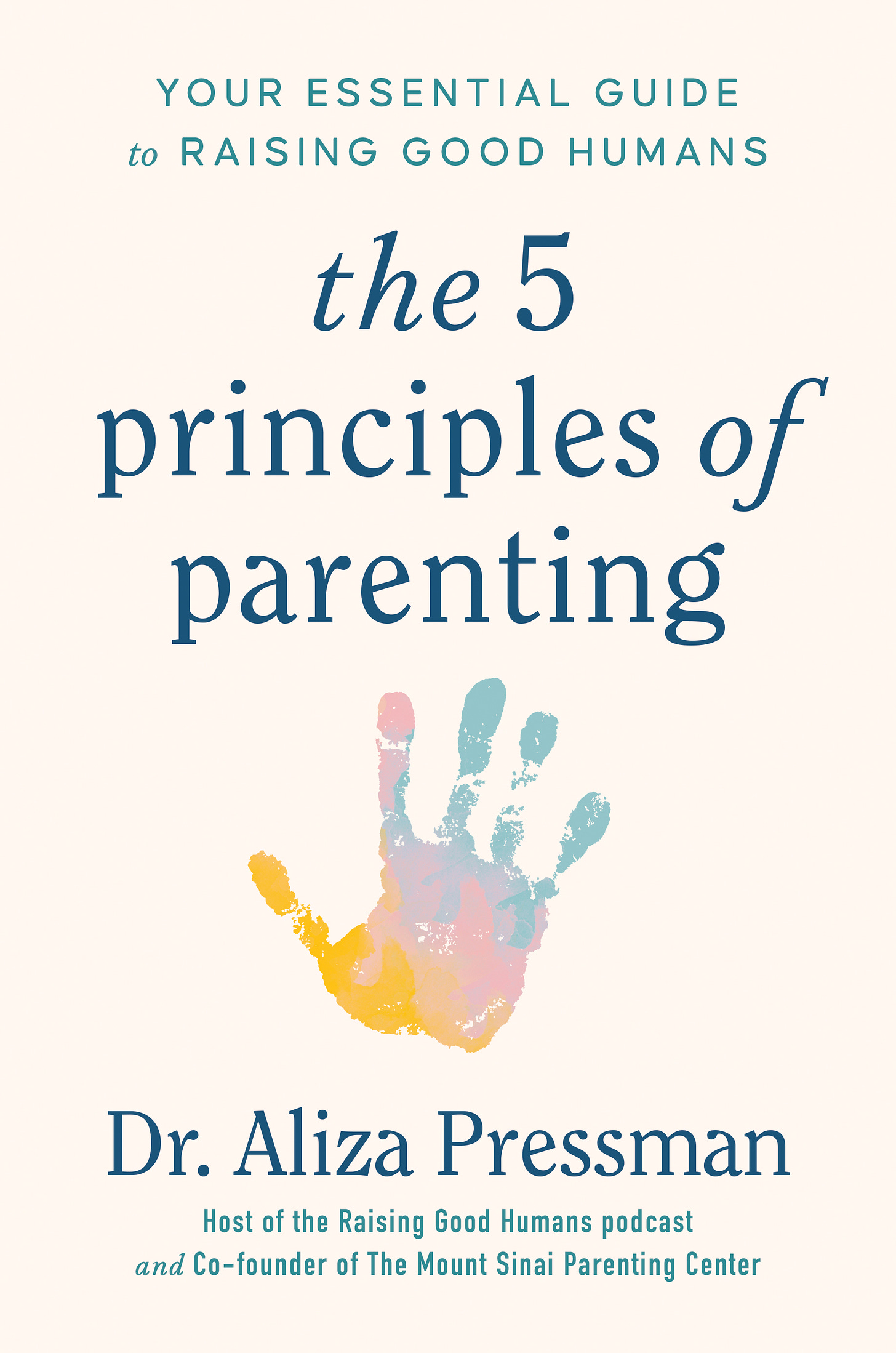Thanks for reading Raising Good Humans on Substack! My first book, The Five Principles of Parenting: Your Essential Guide to Raising Good Humans is now available for purchase here.

In today's fast-paced world, where distractions are abundant and the pressure to succeed is high, raising engaged learners can feel like a daunting task. Research shows that many students are disengaged from school, feeling bored, overwhelmed, and struggling with the pressure to achieve.
“Disengagement is not just about academics. It is really about raising curious kids who can thrive in whatever way is best for them, and in whatever uncertain world they are going to inherit.” Dr. Aliza Pressman
On the most recent episode of the Raising Good Humans Podcast, Jenny Anderson, award winning journalist and co-author of The Disengaged Teen, joins me to discuss what parents can do to support better learners at every age. It can be done!
What is disengagement? Disengagement is more than just poor grades; it's a complex interplay of actions, thoughts, and feelings about learning. It affects not only academic performance but also a child's overall well-being. This is NOT about passion. Though we mistakenly think every child needs to find something to be passionate about (most kids are NOT), engagement is about helping them to find connection, meaning and curiosity. This can be about whatever matters to them in their lives, according to their own hierarchy. This isn’t excellence in our definition, this is meaning in their own lives.
“We have done a massive disservice to kids in saying, “find your passion.” There is no passion. Find some interests, follow those, and if they change, change with them.” Jenny Anderson
To better understand your child's learning style and engagement level, Jenny and co-author Rebecca Winthrop, lay out four modes of learning. It’s important to note from the start that children move in and out of these modes, all of the time, as they should. These modes are meant to help in our understanding, not to label. The point is to bring awareness to what we can do as parents, to help shift modes when our kids need it, but not to pigeonhole them into one framework.
Resistors: These children may withdraw or act out, expressing their disengagement through defiance or avoidance. These kids are often labeled the “Problem Child.” Though the behavior may be difficult, Jenny explains that working towards the “why” behind the behavior (as friend Tina Payne Bryson calls, “chasing the why”) can help reframe this experience.
Passengers: These children coast along, doing the bare minimum and often complain of boredom. They are often overlooked because they don’t require the teacher's attention constantly, and don’t stand out with great grades. Somewhere in the middle, these children can be difficult to engage with because of a sense of laziness or apathy. Jenny suggests trying to give them greater autonomy to learn from their mistakes, to see the consequences of their disengagement, and to find places outside of academics where they feel a greater sense of interest.
Achievers: These children strive for good grades and external validation. No one worries about them because their potential seems endless, and their capacity limitless. However, research (and practice) tells us to proceed with caution. While achievers may appear successful, their self-worth is often tied to their achievements, making them vulnerable to burnout and mental health issues. Helping your achiever to distinguish between “good” and “bad” achievement may be the key to offering balance that they naturally lack.
Explorers: These children are intrinsically motivated, curious, and know how to set goals and seek help when needed. Though we never like to say one way is better than the others, research shows that this is the ideal mode of learning. This child can set a goal, use the support they have to meet it, and balance their time and efforts accordingly.
Knowing the modes and with greater understanding of your child, parents can then begin to influence how they operate. This includes:
Parent the child you have in the mode they're in. There is no one-size-fits-all approach to parenting. Recognize your child's individual learning style and adapt your strategies accordingly. These are moving targets and we need to support our children in the here and now, without catastrophizing for the future. We also need to avoid adding our own anxiety, or our own definitions of success, to the pile of pressure our children already receive from society around them.
For resistors. Dig deeper to understand the root of their resistance. It could be a learning disability, bullying, mental health challenges, or family issues. Offer support and guidance to address these underlying problems. Jenny actually reframes the opportunity that behaviors give parents to start a dialogue and identify that something is going on. By noticing, and exploring, parents can get to the heart of the real cause and stop the focus on the external outbursts.
For passengers. Give them some autonomy and allow them to experience the consequences of their choices. Help them develop better learning habits by reflecting on their experiences and offering support.
For achievers. Emphasize the importance of balance, rest, and self-care. This can start RIGHT NOW (but it is never too late). Talk about people in the world who find balance in different ways, and narrate this. Enjoy some unproductive time as a family and show them that effort cannot be at 100% all of the time. Help them understand that their worth extends beyond their achievements and do more based on interest, not outcome.
For explorers. Continue to nurture their curiosity and provide opportunities for them to pursue their passions. Offer praise for their efforts, to seek and use help, to make mistakes and take risks, and remember how much courage they show in knowing and trusting their own sense of engagement.
Practical tips for parents, Based on the evidence. These are simple (whew!), and work at every age.
Avoid fixed mindset comments. Don't say things like "I'm not a math person." This reinforces the idea that intelligence is fixed and can discourage effort.
Talk about the content of their learning. Show interest in what they're learning at school. Ask open-ended questions and validate their experiences.
Model the thrill of learning and making mistakes. Share your own learning experiences, including your mistakes. This shows that making mistakes is a natural part of the learning process. Jenny has a great example where she told her children about printing a retraction for the New York Times. Her kids were horrified that it happened, and shocked that she survived! Breaking our children’s terrified notions of “failure” and its consequences is critical work for all of us.
Ask about the good class, not the bad class. Start conversations on a positive note by asking about something they enjoyed at school. Once they have spoken about the good stuff, they are more likely to share some of the challenges…if they want to. Having your own agenda won’t contribute to an atmosphere of connection.
Connect the dots. Help your child see the relevance of what they're learning to the real world. Jenny says that only 30% of kids between 3rd and 12th grades say that what they learn at school is connected in any way to what's happening in the world. That makes appreciating their education VERY hard. Help combat this by drawing the lines between what they are learning and what they experience. Use your life experience, and all the context you have, to help them see the value of what they are learning. Though we wish that schools would do more of this in the classroom, this is one of the areas where parents can make a big impact.
A quick note on agency. Agency is the ability to set goals, make decisions, and take ownership of one's learning. It's a crucial skill for success in school and in life. As we have talked about many, many times, supporting autonomy really matters. BUT, we are not saying that it means that kids don’t need boundaries. Agency is about helping your children to practice making decisions, and make mistakes, so that they can get better at making those decisions in the future. Our children still need parents. There is no escaping that role.
“You do not get to learn to make good decisions by never making any decisions.” Jenny Anderson
Remember, raising engaged learners is a journey, not a destination. When we can remember that we are all learning - every single day - we can all be more curious, forgiving, and engaged.
A quick reminder to buy my first book, The Five Principles of Parenting, and write a review from wherever you order. Reviews really help to get the book noticed, and to spread the word. Please especially rate and review any books purchased on Amazon (it shockingly really, really matters!). Also, when you receive the book, snap a quick pic with it and post on social media. Share one thing you love about it and help me to get more copies into the hands of parents in your community. Tell a friend about the book, or about something you found helpful in the book. Parents look to each other for advice, and I’d love to be a part of the support you pass on to your loved ones.






I love this article, Aliza. It is amazingly accurate and helpful if parents can understand the differences that you have pointed out in the way different children approach learning at different times and how influential they, as parents, can be in helping them to handle both the positive and negative aspects of each mode. Your last point about connecting the dots is so valuable. As a teacher for more years than I like to admit to, that connection makes a world of differnence. Apathy in parents most often results in apathy in children and that's a hard battle for a teacher to overcome in the classroom setting. I will be restacking this post, but I would also like to invite you and your readers to visit my own newly launched substack, Storybook Hut. If any of them have young children, I hope they will enjoy my audio picture book library that enables children (and their grown ups) to access online picture storybooks at home or on the go without the usual concerns of the harmful effects of 'screen time' (all Storybook Hut images are static). Blessings for 2025! Angie